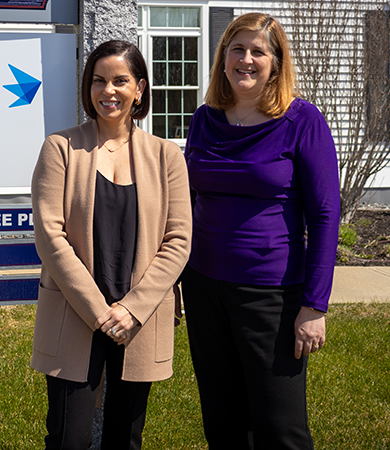
Katy and Steve Singlar
Access for Everyone
Generous gift expands pediatric mental health services
Longtime Exeter residents Katy and Steve Singlar have witnessed firsthand the increasing demand for mental health services in their community. “There’s been a need for quite some time,” says Katy. “The pandemic only exacerbated it, especially for children.”
To ensure young people can receive timely treatment close to home, the Singlars recently made a generous $25,000 gift to expand pediatric mental health programming at Exeter Hospital’s affiliate primary care practice, Core Physicians. This is not the first time the couple has stepped up to support critical mental health resources. They previously contributed $25,000 to a pilot program that enhanced mental health care in the Emergency Department (ED).
[PAGE_IMAGE_2]
[QUOTE_HERE]
As parents to three children—two of whom were born at Exeter—the Singlars have a deep understanding of the importance of local access to quality pediatric care. When their kids—now in their teens and 20s—were growing up, Katy and Steve relied on their pediatricians not only for treatment, but comfort and reassurance. “When I had concerns, they genuinely listened and helped me feel like everything was going to be okay,” recalls Katy. The Singlars’ latest gift will help to ensure that compassionate, comprehensive care remains available for the next generation and can evolve to meet young people’s changing needs.
Specifically, their contribution will allow for the expansion of an approach known as the Pediatric Collaborative Care Model (CoCM), which embeds behavioral health providers in primary care settings. The increased demand for mental health care—coupled with a shortage of qualified local providers that are accepting new patients and insurance—means that more and more families are turning to their pediatricians for support. “We still treat physical ailments, but a large percentage of our day is spent on behavioral health because that’s what our patients need,” says Alexandra DeBlasio Bonesho, MD, Medical Director of Core Pediatric and Adolescent Medicine.
By increasing the presence of behavioral health providers in pediatric practices, philanthropic support for the Pediatric CoCM enables primary care physicians to more quickly connect kids and teens with resources until families can transition to longer-term treatment. In New Hampshire, families can wait six months or more for an appointment with a mental health provider—a delay that can have profound implications for patient outcomes. “The Pediatric CoCM all comes down to early access and access for everyone,” says Sarah McGuire, RN, DNP, CNL, Director of Program Performance at Core Physicians. “If you can address issues early on, you’re going to really change the trajectory not just of that kid’s life, but that family’s life.” Through its focus on early intervention, the Pediatric CoCM aims to prevent the development of more serious conditions, which are more likely to result in hospitalizations or ED visits, ultimately improving young people’s long-term health and well-being.
For the Singlars, supporting the Pediatric CoCM is a meaningful way to give back and ease the challenges that so many local families are experiencing. “Steve and I hope this program will help alleviate stress during what can be a very difficult time for both kids and parents,” says Katy, who notes how important it is for Seacoast residents to support one another. “Exeter is a community hospital, and we’re all part of this community,” she adds. “It’s important to do what we can to ensure that we and our neighbors have access to high-quality care.”

Sarah McGuire, RN, DNP, CNL, and Alexandra DeBlasio Bonesho, MD